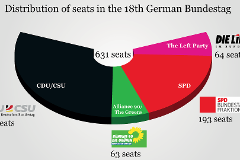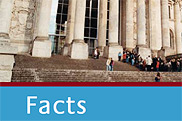Navigationspfad: Homepage > German Bundestag
Parliamentary groups
In the 18th German Bundestag, there are four parliamentary groups. The Christian Democratic Union/Christian Social Union (CDU/CSU) forms the largest parliamentary group with 311 seats, followed by the Social Democratic Party of Germany (SPD) with 192 seats. The Left Party parliamentary group holds 64 seats and the Alliance 90/The Greens parliamentary group 63. The number of seats they hold determines their relative strengths and is decisive for the composition of the Council of Elders and the committees. The 18th German Bundestag has 630 Members altogether.
A parliamentary group can be formed by at least five percent of the Members of the German Bundestag, who usually belong to the same party. The formation of a parliamentary group enables them to work together to achieve shared goals.
Parties are associations of citizens with similar political ideas. The members of a party are elected to the Bundestag directly from constituencies or indirectly on Land lists.
The plenary, consisting of the entirety of the Members of the German Bundestag, sits and conducts its business in public. All items of business are dealt with and elections conducted during plenary sittings.
The date and agenda for each sitting are agreed in the Council of Elders and communicated to the Federal Government and the Bundesrat. The sittings are conducted by the President of the German Bundestag or one of his or her deputies.
On a motion tabled by one tenth of its Members or the Federal Government, the Bundestag may exclude the public by a two-thirds majority. The public may not be present when the plenary votes on motions of this kind.



